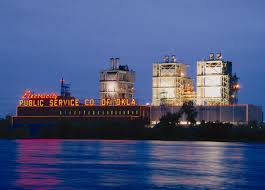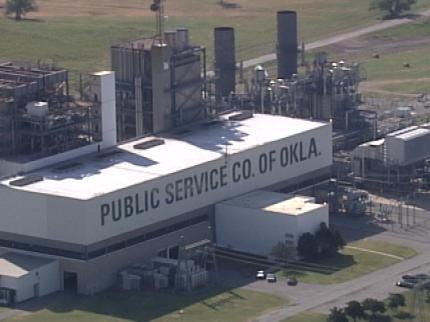
Public Service Company of Oklahoma made recent regulatory filings seeking preapproval of more than $1.2 billion in energy projects that could mean higher consumer electric rates or more than $10 extra a month, if approved by Corporation Commissioners.
“New loads, mostly from commercial and industrial customers, are driving the increase in demand for electric service,” explained Matthew A. Horeled, Vice President, Regulatory Finance for PSO, in a September 12 filing with the Oklahoma Corporation Commission.
He called the load growth in residential class of service to be “minor” and said commercial and industrial growth is being fueled by new customers coming on to the system with electric needs far greater than what PSO has experienced in the past.
Horeled said PSO signed a Letter of Agreement with one new customer that will “eventually result in a load of over 1,000 MW” while the utility’s previous largest single customer was 130 MW. He did not identify the new customer with the large load demand.
“Specifically, PSO is requesting approval of eight generation resources to meet customer needs,” added Horeled. Seven of the projects involve up to 1,500 megawatts of Southwest Power Pool accredited capacity.
“PSO is also requesting approval and cost recovery of two combustion turbines that are each 225 MW and expected to be in service no later than December 28,” said Horeled in his testimony.

The company is also using a new state law to allow the implementation of rates while some of the projects are under construction.
“The Company is requesting a determination by this Commission that there is a need for the projects and that reasonable alternatives have been considered; that the Energy Security
Rider be approved as proposed by the Company to include a return on construction work in progress, operation and maintenance expenses, depreciation, amortization, ad valorum taxes, production tax credits, investment tax credits, and a return on the assets until they are incorporated into base rates through a general rate case,” according to the filing.
The major request follows the Corporation Commissions June 2025 approval of PSO’s $730 million acquisition of the Green Country Power Plant in Jenks, a purchase that resulted in a $7.19 monthly increase for ratepayers and $6.47 in 2026.
When PSO took control in July of this year, the company stated the 795-megawatt natural gas plant “will deliver dependable, cost-effective electricity to homes and businesses across the state” while PSO is “enhancing energy reliability for its customers by becoming the full owner and operator of the Green Country Power Plant.”
PSO contended at the time that the purchase of the Green Country Generation Facility was essential to “meet all normal demands for service and provide a reasonable reserve for emergencies,” otherwise its summer capacity position would be deficient 10 Megawatts in 2027, 470 MW in 2028 and 1,766 MW in 2029.
Total cost of the newest selected projects is claimed to be $1.255 billion and the total estimated retail rate impact in 2029, once the resources have entered commercial operation, would be $157.1 million.
Rebecca A. Schwarz, Director of Regulatory Pricing and Analysis for American Electric Power Service Corporation, PSO’s parent company, testified the estimated retail rate impact from 2026 through 2029, reflects a “phased recovery approach” beginning with Construction Work in Progress.
“The total estimated retail rate impact in 2029 is $157.1 million, representing an 8.54% in the average retail rate,” she continued in her testimony.
“In 2029, once all facilities are operational, the projected impact reflects a net increase of $14.33 per month, representing a 9.59% increase in the total monthly bill. This estimate incorporates the combined effects of the selected facilities. When factoring in load growth estimates and economic development forecasts, the total estimated typical residential customer bill is projected to increase to $10.34 per month, representing a 6.92% increase.”

One of the proposed projects carries a price tag of $539,800,000. It is the construction of a large natural gas project, as described by AEP’s Michael J. Dilley, Director of Projects.
costs.”

